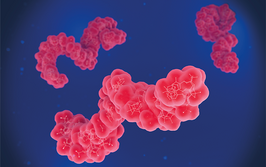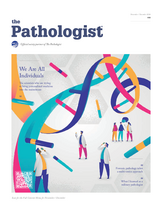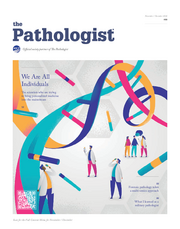
Single-Gene Source for Schizophrenia?
Mutations in the SETD1A gene are rare, but significantly increase patients’ risk of schizophrenia and neurodevelopmental disorders
Mental illnesses are tough to pin down – they’re difficult to predict, tricky to diagnose, and challenging to treat. And yet they carry with them a huge burden, not only to those who suffer from them, but to society as a whole. The socioeconomic cost of mental illness in developed countries is estimated to be as much as 4 percent of GNP (1). That’s a significant motivator to look at the nuts and bolts of neuropsychiatric disorders – and now, for the first time, researchers have conclusively identified a gene involved with one.
Mutations in the SETD1A gene almost never occur in the general population. They’re not common in people with schizophrenia, either, arising in fewer than one in every 1,000 patients. But even though the gene is related to only a small percentage of patients, its mutations have been shown to increase the risk of schizophrenia 35-fold – and place patients at a higher risk of other disorders as well (2). “Our results already showed that damaging variants in SETD1A also cause early childhood developmental disorders, intellectual disability and epilepsy,” explains Jeffrey Barrett, senior author on the paper. “This is a pattern that has been seen before in other genes, but never before including schizophrenia. So we see this link as an important piece of evidence about the interrelatedness of different neurodevelopmental disorders.”
Unfortunately, the rarity of damaging SETD1A variants means that they probably won’t lend themselves to screening or diagnostic use. That doesn’t mean they won’t be useful in the clinic, though. “Where we really hope to make a difference is by implicating new biology that might be useful for discovering new drugs for schizophrenia. SETD1A is part of pathway that regulates how DNA folds and unfolds during development to help switch on and off the right genes at the right times.” Barrett points out that additional genes in the same pathway may also be involved in schizophrenia risk, so the pathway as a whole may offer an avenue for research into new therapeutics.
- World Health Organization, “Investing in Mental Health,” (2003). Available at: bit.ly/1Dmf6Ce. Accessed April 1, 2016.
- T Singh et al., “Rare loss-of-function variants in SETD1A are associated with schizophrenia and developmental disorders”, Nat Neurosci, 19, 571–577 (2016). PMID: 26974950.

While obtaining degrees in biology from the University of Alberta and biochemistry from Penn State College of Medicine, I worked as a freelance science and medical writer. I was able to hone my skills in research, presentation and scientific writing by assembling grants and journal articles, speaking at international conferences, and consulting on topics ranging from medical education to comic book science. As much as I’ve enjoyed designing new bacteria and plausible superheroes, though, I’m more pleased than ever to be at Texere, using my writing and editing skills to create great content for a professional audience.




















